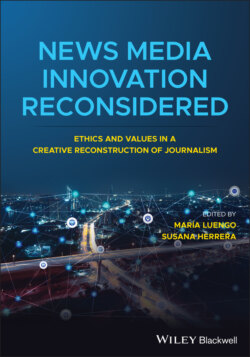Читать книгу News Media Innovation Reconsidered - Группа авторов - Страница 5
Introduction Journalism’s Creative Reconstruction: How Innovation in News Is Embracing Enduring Professional and Civil Values
ОглавлениеMaría Luengo
News media are suffering a Schumpeterian “creative destruction” (Schumpeter, 1975 [1942]). This has been the received wisdom among scholars and media watchers evaluating the impact of digital technology on journalism today. However, is “creative destruction” an appropriate term in this case? The use of it to explain this recent period of upheaval in journalism usually involves reductive techno-economic paradigms that overlook critical cultural and ethical dimensions.
This collective book aims to understand technological innovation as “creative reconstruction” (Alexander, 2016). The idea of creative reconstruction was coined by cultural sociologist Jeffrey C. Alexander around 2014, after he and a group of cultural sociologists and journalism scholars expressed frustration at how academics and pundits were narrowly theorizing in purely technological and economic terms the current “crisis of journalism” and the consequent changes and innovations in news. This perspective was crystalized in The Crisis of Journalism Reconsidered (Alexander, Breese, and Luengo, 2016), a book that shows how crisis and change in journalism are equally caused by cultural and ethical factors. The empirical investigations in The Crisis of Journalism Reconsidered demonstrate that intense alarm over digital change implies the strength of both journalistic ethics and democratic values (Carlson, 2016; Luengo, 2016). The book argues that the compulsion to defend these ethical and civil commitments actually energizes a search for new organizational and technological forms.
In line with this previous cultural sociological theorizing and research, this book focuses on the energizing of journalism’s ethical and civil ideals by looking at emerging journalistic practices and products such as 360-degree immersive journalism, newsgames, the automatization and personalization of news, artificial-intelligence news production, and data journalism. Our book theoretically and empirically explores new concepts, models, initiatives, and practices that show how forms of professional ethics that overlap notably with civil ideals—truth seeking, transparency, accuracy, accountability, and civic engagement, among other ethical values—are invigorating the innovative dimension of journalism. If Alexander, Breese, and Luengo’s cultural sociological perspective issued a significant challenge to the technological and economic view of a so-called “crisis” in the sector in a recent context of dramatic changes within journalism, this new collective book entails a fresh turn of the screw against reductive explanations, this time specifically within the area of news innovation.
